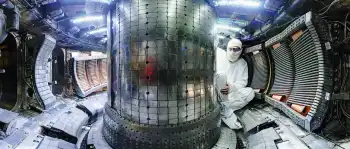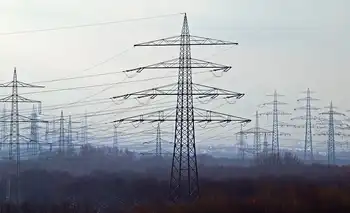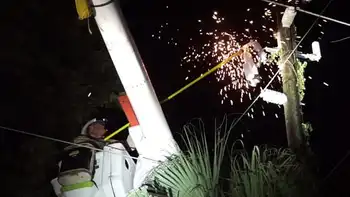North American Power Officials want a Regulated Fix
HALIFAX - - Nine months after the largest blackout in North America's history, legislation to prevent another massive outage is floundering in the United States, say power officials from both sides of the border.=
"I don't know much about the process of putting legislation through in the United States but, gee, we just interrupted 50 million people - I'm not sure what it takes to light a fire (under the U.S.)," Paul Murphy, chief operating officer of the Ontario Independent Electricity Operator, said recently.
Murphy was speaking at an international energy industry conference in Halifax as part of a panel discussion on last summer's blackout.
"I've been extremely disappointed with the progress of the electricity legislation in the United States," said Murphy, whose organization monitors and enforces industry standards in Ontario.
The proposed American legislation would make it possible to penalize power companies and utilities that fail to meet performance standards. The majority of Canadian jurisdictions are already taking steps to make the industry standards mandatory, or have done so already.
"We've been needing it for probably the last decade," said Michehl Gent, president of the North American Electric Reliability Council. "I think the blackout is a demonstration of why."
The council currently sets voluntary standards that companies and utilities are supposed to meet.
The Aug. 14 outage disrupted power across eight states and much of Ontario, and cost the affected areas an estimated $6 billion in lost business.
A Canada-U.S. task force eventually blamed the extent of the outage on a combination of human errors and equipment failures in Ohio.
"If we'd had the legislation five years ago, we wouldn't of had the blackout," said Gent.
The reliability provisions in the U.S. are part of an energy bill which has so far failed to pass that country's congress because of other controversial elements it contains.
Critics have said the bill is loaded with special favours and tax breaks for industry, and would threaten environmental protection measures.
The American rule changes are important to Canada's energy market which, in many cases, is tied more closely to the U.S. than it is across Canada's own provincial boundaries.
Hans Konow, president of the Canadian Electricity Association, said that the market is more fragmented in the States, creating more need for the kind of hard, fast and enforceable standards that would come with the energy bill's passing.
"Any one of us can pull the others down," Konow said, pointing to the interconnectedness of the system and last year's outage, which was blamed on the failure of one company in Ohio.
Despite the faltering legislation, Gent called the likelihood of a repeat of last summer's power outage "a very remote possibility."
His organization hopes to have inspected about 21 of the largest electricity control centres in North America, out of a total of 144 sites, by the end of June.
That would represent an inspection of the power supply for about 80 per cent of customers in the United States and Canada, he said.
"I think we're very much, much more safer, because we have everybody focused on operating a reliable system."
Industry insists it wouldn't be wise to separate Canadian energy utilities from the U.S. market, as both countries currently benefit from the selling of surplus energy to the other.
Gent, meanwhile, said he can't even offer an estimate of when the energy bill might pass in the U.S.
"We used to say it's going to take a blackout - but that didn't seem to do it."
Related News

Why the promise of nuclear fusion is no longer a pipe dream
GENEVA - It sounds like the stuff of dreams: a virtually limitless source of energy that doesn’t produce greenhouse gases or radioactive waste. That’s the promise of nuclear fusion, which for decades has been nothing more than a fantasy due to insurmountable technical challenges. But things are heating up in what has turned into a race to create what amounts to an artificial sun here on Earth, one that can provide power for our kettles, cars and light bulbs.
Today’s nuclear power plants create electricity through nuclear fission, in which atoms are split. Nuclear fusion however, involves combining atomic nuclei to…




